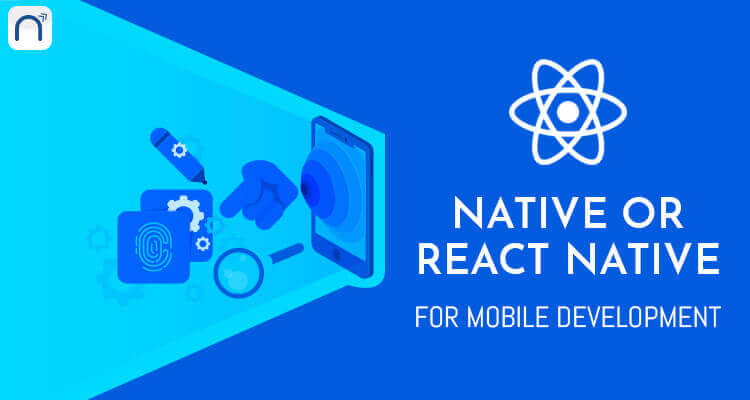The application designers both Android and iOS are often confused over the selection of platform and technology that they should start working on. However, it is critical to making the choice, whether to use a React Native or Native platform for the development of mobile apps. Developers who are well experienced in mobile app development is expected to have deep knowledge regarding both these platforms.
However, for developers venturing into development newly or for start-up companies venturing into mobile apps, it is essential that they take a critical decision on which platform to choose as their stepping stone. As you realize that both Android and iOS are solid contenders, the same can be said in regards to Native and React Native. Thus, first we should quickly examine both the stages and after that make a near report by delving into the subtle elements:

The Native Application is produced for a particular platform and the developer needs to make utilization of specific tools for building up the applications. For example, the Android application developer needs to code in Java or Kotlin with the assistance of Android Studio.
However, an iOS developer should make utilization of Objective-C or Swift. Xcode is the Integrated Development Environment (IDE) here. In this way, it has been seen that in both famous Operating Systems, (Android or iOS), you get distinctive programming languages. React Native is an open source structure that has been produced by the Facebook. It presented the idea of web advancement into versatile application building utilizing the JavaScript. Respond Native offers you the chance to make applications at the same time at one time thus you don't have to create two distinct applications. Just a solitary code is sufficient for both the Android and iOS stages.
Which is Easier – React Native or Native as Programming Language
All things considered, in the event that you take a specialist conclusion from an expert developer, at that point yes, the appropriate response direct is React Native. The reason – JavaScript is a significantly more straightforward programming dialect both as far as learning and in addition investigating. The mistakes amid the aggregating have a tendency to get covered up inside the codes, which you can identify later.

Discussing Objective-C or Swift, it is viewed as a hard and strict dialect, however, ends up less demanding to get with the shortcomings at a beginning period while aggregating. And furthermore, Objective C and Java are getting moved up to coordinate the benchmarks of the cutting edge dialect.
Respond Native again is a victor as it lessens the season of application improvement and the cost in light of the fact that the application engineers can create one application for two stages.
Correlation on the Basis of Documentation
All things considered, here in this section both React Native and Native applications really give an extreme rivalry to each other. The Swift has been warmly gotten by the application improvement industry, disregarding the way that, it has quite recently made a passage.
Issues Related to Web App
With regards to web application advancement, React Native once more takes the show from Native Application. It has been specified before that programming in React Native is more straightforward. Here as well, a great extensive information of web application advancement will demonstrate useful as investigating streams and toolset design winds up simpler. Additionally, in the event that you are likewise collaborating with a React.js designer, you don't have to do web programming.
The Battle Over Performance of the Apps
Thus, when you analyze both programming dialects based on execution, Native Applications bulldozes React Native. Obviously, you can create basic applications utilizing the React Native, however, when you endeavor to execute the propelled advancements, for example, AR/VR, IoT or Blockchain, it will begin making troubles. This is the place local applications give a smooth section to the designers, as fusing the methods ends up less demanding.
Distributing on the App Store
Once the application advancement is finished and tried, it's the ideal opportunity for it to get distributed or discharged from the App Store; Google Play and Apple Store. In any case, on the off chance that you are secured whether your application will be acknowledged by the Play Store utilizing Native or React Native, at that point, simply take a load off. Both Google Play Store and Apple App Store will acknowledge your applications easily.
When Developing Cross-Platform Apps
Indeed, when an application engineer is choosing to make a cross-stage application, you have to decide on the local applications due to the diverse sorts of complexities required there. Any of the applications have backend and server side and the backend includes half of the portable advancement exertion. Local applications additionally give you the opportunity of the coding procedure.
Refreshing the Apps
Refreshing the applications is a customary practice to keep up its better execution. Be that as it may, thinking about the two projects, one would propose going for Native Applications. Refreshing the application is less demanding as Apple and Google both give refreshes most extreme in reverse similarity. This permits your application to run longer.
Respond Native will be most appropriate for on the off chance that you are keen on making an application like Facebook or Instagram having a substantial group of reusable components.
Recent Insights
- Why choose React Native for mobile app development
- Innovative mobile app ideas & latest trends for the sports industry
- The future of web development with AI
- Video analytics: Delving deep to its applications and opportunities
- A complete guide to AI object tracking with DeepSORT
- Nextbrain giving platinum sponsorship for golden tree awards, dubai



Saran
Author
Views : 3085 | Posted on September 15, 2020